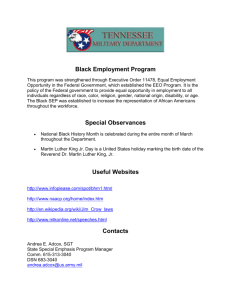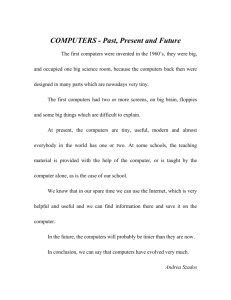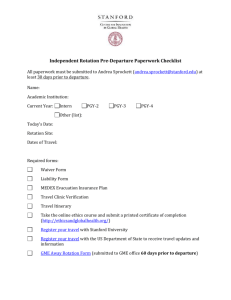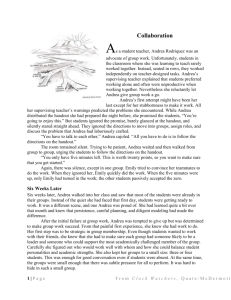File - Katie Dewey Hill
advertisement
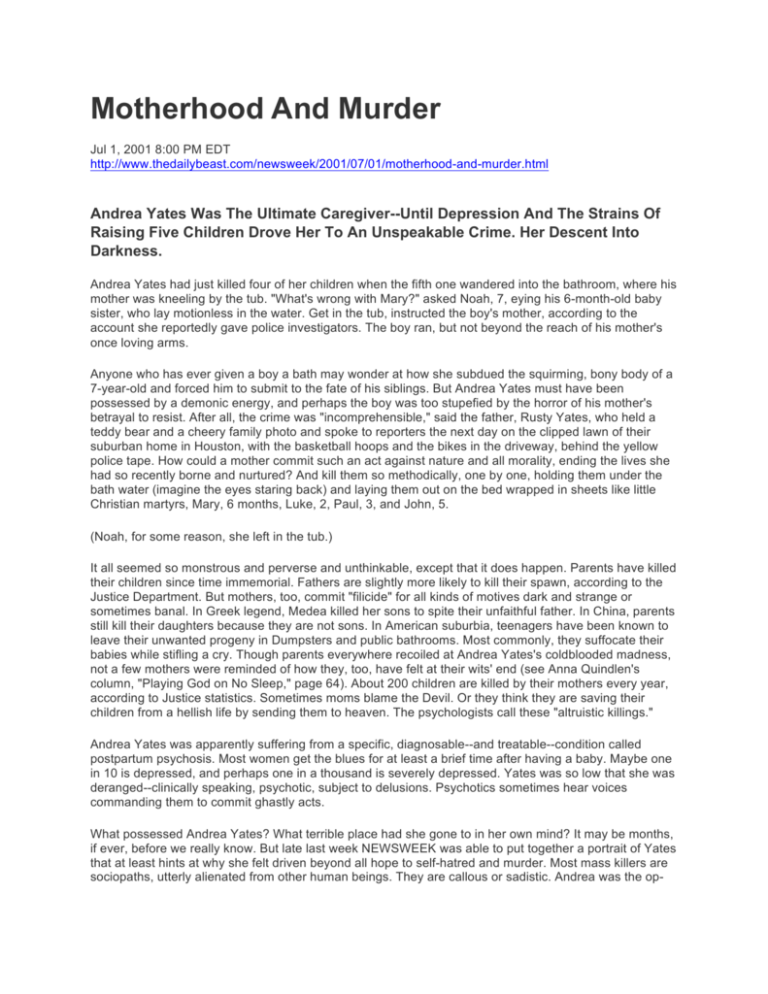
Motherhood And Murder Jul 1, 2001 8:00 PM EDT http://www.thedailybeast.com/newsweek/2001/07/01/motherhood-and-murder.html Andrea Yates Was The Ultimate Caregiver--Until Depression And The Strains Of Raising Five Children Drove Her To An Unspeakable Crime. Her Descent Into Darkness. Andrea Yates had just killed four of her children when the fifth one wandered into the bathroom, where his mother was kneeling by the tub. "What's wrong with Mary?" asked Noah, 7, eying his 6-month-old baby sister, who lay motionless in the water. Get in the tub, instructed the boy's mother, according to the account she reportedly gave police investigators. The boy ran, but not beyond the reach of his mother's once loving arms. Anyone who has ever given a boy a bath may wonder at how she subdued the squirming, bony body of a 7-year-old and forced him to submit to the fate of his siblings. But Andrea Yates must have been possessed by a demonic energy, and perhaps the boy was too stupefied by the horror of his mother's betrayal to resist. After all, the crime was "incomprehensible," said the father, Rusty Yates, who held a teddy bear and a cheery family photo and spoke to reporters the next day on the clipped lawn of their suburban home in Houston, with the basketball hoops and the bikes in the driveway, behind the yellow police tape. How could a mother commit such an act against nature and all morality, ending the lives she had so recently borne and nurtured? And kill them so methodically, one by one, holding them under the bath water (imagine the eyes staring back) and laying them out on the bed wrapped in sheets like little Christian martyrs, Mary, 6 months, Luke, 2, Paul, 3, and John, 5. (Noah, for some reason, she left in the tub.) It all seemed so monstrous and perverse and unthinkable, except that it does happen. Parents have killed their children since time immemorial. Fathers are slightly more likely to kill their spawn, according to the Justice Department. But mothers, too, commit "filicide" for all kinds of motives dark and strange or sometimes banal. In Greek legend, Medea killed her sons to spite their unfaithful father. In China, parents still kill their daughters because they are not sons. In American suburbia, teenagers have been known to leave their unwanted progeny in Dumpsters and public bathrooms. Most commonly, they suffocate their babies while stifling a cry. Though parents everywhere recoiled at Andrea Yates's coldblooded madness, not a few mothers were reminded of how they, too, have felt at their wits' end (see Anna Quindlen's column, "Playing God on No Sleep," page 64). About 200 children are killed by their mothers every year, according to Justice statistics. Sometimes moms blame the Devil. Or they think they are saving their children from a hellish life by sending them to heaven. The psychologists call these "altruistic killings." Andrea Yates was apparently suffering from a specific, diagnosable--and treatable--condition called postpartum psychosis. Most women get the blues for at least a brief time after having a baby. Maybe one in 10 is depressed, and perhaps one in a thousand is severely depressed. Yates was so low that she was deranged--clinically speaking, psychotic, subject to delusions. Psychotics sometimes hear voices commanding them to commit ghastly acts. What possessed Andrea Yates? What terrible place had she gone to in her own mind? It may be months, if ever, before we really know. But late last week NEWSWEEK was able to put together a portrait of Yates that at least hints at why she felt driven beyond all hope to self-hatred and murder. Most mass killers are sociopaths, utterly alienated from other human beings. They are callous or sadistic. Andrea was the op- posite; if anything, she apparently cared too much. She may have felt she could never do enough for her demanding husband. In a horribly twisted way, she may have tried to be too good a mother. "She was always trying to be such a good girl," Andrea's mother, Jutta Kennedy, told a NEWSWEEK reporter in an exclusive interview late last week, wiping away tears while watering flowers outside her modest, one-story home. "She was the most compassionate of my children. Always thinking of other people, never herself. She was always trying to care for everybody." Jutta Kennedy recalled how every day, for seven or eight years, Andrea would come to her parents' house to take care of her father, Andrew Kennedy, who suffered from Alzheimer's. "Her father was completely out of it," Mrs. Kennedy said, remembering how her husband had doted on Andrea, the youngest of the five Kennedy children. "Andrea was his baby. She was named for him. And she would do everything for him. She would change his clothes and wash him and help feed him." At the same time, Andrea was often pregnant and caring for her own growing family. Even as she coped with all this, when a neighbor needed help she would run next door, her mother recalled. Andrea had always been the perfect child, eager to please. She was valedictorian of her high-school class and filled her home with swimming trophies. She married another perfect child, Russell (Rusty) Yates, who was working as a computer expert at NASA's Johnson Space Center in Houston. At DuPont Senior High School near Nashville, Tenn., Rusty had been voted "Mr. DuPont," the class favorite, football star and all-round best boy. "If we wanted to have someone to represent us to the nation, Rusty would be the one to do it," said a classmate, Jim Jackson. Another classmate recalled the crowd chanting "Rusty! Rusty!" at pep rallies "for, like, 10 minutes straight." Married in 1993, Rusty and Andrea apparently decided that the best way to bring up the children was to do it themselves. Andrea gave up her job as a nurse in a cancer clinic. "He didn't want her working at all," former neighbor Sylvia Cole told the Houston Chronicle. "He wanted her staying at home." Unlike most parents, they did not turn to a neighborhood school or church to help raise their kids. Though religious, they belonged to different denominations. Andrea had been raised Roman Catholic, and Rusty was a Methodist and high-school member of the evangelical Fellowship of Christian Athletes. The Yates home was full of religious artifacts, according to a policeman at the crime scene. Rusty brought religion to the Tball team he coached for his two oldest boys. "They prayed before every game and after every game, and they prayed at practice," said Rick Mayfield, whose boys also played on the team. Education, like faith, was centered at home. In addition to feeding, bathing and disciplining four rambunctious boys, Andrea taught them phonics and math with workbooks from a home-schooling service. Between caring for her father and her children, it is hard to think that Andrea ever had time for herself. There have been small and vague hints from family members that Andrea showed some signs of mental distress before she began having children, although her mother denied it to NEWSWEEK. Certainly, serious problems surfaced after the birth of her fourth boy, Luke, two years ago. Rusty Yates was not specific about the symptoms, but they must have been severe, because his wife was treated not only with antidepressants, Effexor and Wellbutrin, but with Haldol, a very strong antipsychotic medication. To medical experts, this suggests that she was possibly delusional. The medication seemed to work. "It took a while," said Rusty last week, "but she just snapped out of it, she was like herself again, all of a sudden." But not before she tried to kill herself. According to a neighbor of her parents, Jesse Torres, Andrea overdosed at her parents' house in June 1999 by swallowing a handful of pills prescribed for her ailing father. Torres had been struck by how much she was struggling at the time, trying to care for her father and her children at once. This neighbor had observed Andrea on a ladder precariously decorating a Christmas tree while heavily pregnant and running around her parents' kitchen, trying to feed her parents and children as her own plate grew cold. The Yateses were almost certainly warned by doctors that postpartum depression often recurs when more children come along. Asked last week by a reporter if he had "worried about having more kids, knowing those problems were out there," Rusty replied: "I talked to Andrea when she was feeling a little bit better. We had a good talk about that. And, you know, both of us really went into our marriage saying we'll just have as many kids as come along. And that's what we wanted." Andrea's depression returned with a vengeance within a few months of the birth of her fifth child last winter, her daughter, Mary. According to Rusty, it was triggered or at least aggravated by the death of her father. Without him to care for, overwhelmed by her own family, "she just went spiraling down," said Rusty. This time she did not return to normal. "She never responded that well," said Rusty. "She got to about, maybe, 65 percent, and sort of stayed there." She became "robotic," he said, and showed "nervous habits... particular to her." Rusty described his wife's tortured state in a strange impromptu press conference on his lawn the day after the murder. He had lain awake all night, he said, wondering what he might have done differently. Rusty was almost eerily lucid, coherent and reflective, though his forehead glistened with sweat and his eyes had the fixed look of shock. "My wife, I'm supportive of her. But on the other [hand], I know that the woman here is not the woman who killed my children... One side of me blames her because, you know, she did it. But the other side of me says, 'Well, she didn't, because that wasn't her; she wasn't in her right frame of mind'." He spoke of how she showed her love for her children, how at Valentine's Day she had made each one little books of coupons--"one was good for a hug, one was good for a game of your choice." But he added, "She's a pretty private person. She doesn't say much." Andrea's brother Andrew Kennedy had also been disturbed by his sister's fragile state. "She'd gotten better for a while," he told The Dallas Morning News. "But recently you could tell by looking at her. I'd say, 'How are you doing?' And she'd say, 'OK.' But I could sense it wasn't OK. My sister, she didn't open up." He said that he had noticed "changes" in Andrea's deportment even before she began having children in 1994. "I think it was a slow process," said Kennedy. "Both she and her husband, we talked to them a lot. But they were kind of--you know how some people don't like to ask for help? It was kind of that way. They didn't want to talk." In an interview with NEWSWEEK, her other brother, Brian, was asked if his family supported Rusty. Brian Kennedy paused for a moment and said, "You should ask our lawyer that question--I'd like to say some things, but the truth will eventually come out." (Andrea Yates's lawyer, George Parnham, attributed Brian's remark to "the emotionalism of the moment" and said the family is "united.") Andrea had been contemplating murdering her children for some time, according to her later confession. But Rusty's mother, Dora Yates, thought Andrea was getting better. Last Tuesday--the day before she drowned her children--Dora had seen her daughter-in-law talking to her children and rearranging furniture, all in all seeming fairly normal. Dora Yates told a friend that Andrea had just been to the doctor and had changed medication. She was apparently contemplating therapy. Up to this point, she had been reluctant to talk to a doctor about her problems. She was taken off the powerful anti-psychotic drug Haldol--in hindsight, an unfortunate step. It is hard to conceive of the snakes that were writhing in her head. She would tell police only that she believed she was a bad mother, and that her children were hopelessly damaged. Perhaps, in some godforsaken way, she believed that the time had come to set them free. At 9 the next morning, she said goodbye to her husband as he left for work. In an hour, her mother-in-law was due to arrive to help with the kids. According to a report in the Houston Chronicle, quoting a police source who reviewed her taped confession, Andrea filled the bathtub and began killing her children. Luke was the first to die. Then Paul, followed by John. When each child was dead, she carried the body to the bedroom, placed it on the bed and covered it with a sheet. Then she gathered up the baby, Mary, and placed her in the tub. But as she pushed her baby below the water, Noah caught her in the act--and tried to run. She chased him and wrestled him into the tub, alongside his sister, then removed her little girl and placed her on the bed by her brothers. Then she called the police and her husband. Andrea's tone of voice made him nervous, Rusty recalled. "What's wrong?" he asked. "You need to come home," she said. "Anyone hurt?" he asked. "Yes," she replied. "Who?" he asked. "The children. All of them." Rusty's "heart just sank," he told reporters. At the Yates house, Houston police officer Frank Stumpo found Andrea sitting calmly on the couch with her hands folded across her lap. "She looked at me and looked away," Stumpo told NEWSWEEK, as he recalled the macabre scene in an exclusive interview. Stumpo peered into the bedroom and saw a little head, which he mistook for a moment for a doll. "It was the 5-year-old," Stumpo recalled. "I picked up the blanket and more children started coming into view. I saw another body and another body and another body. Everybody was wet. Their hair was matted and wet." Stumpo felt the 5-year-old's face. It was still warm. In the bathroom, he saw an overturned laundry basket and a crumpled bathmat. A little boy was floating facedown in the tub. He found Andrea still sitting complacently in the living room. "Do you realize what you have done?" he asked her. She looked right at him and said, "Yes, I do." She told the police, "I killed my children." Stumpo looked around. The house was a mess, he thought, dirty and unkempt. He heard yelling outside. It was Rusty Yates, barred by police from entering the crime scene. The father came to the back door and got on his hands and knees and looked through a small opening in the drapery. For a moment, he made eye contact with Andrea. Rusty began banging on the door frame and yelling, "Andrea, how could you do this! How could you do this!" She sat silent, and Stumpo pulled the drape closed. Later Stumpo went outside and asked Rusty if he wanted a glass of water. According to Stumpo, Rusty replied that a glass of water would be nice, but that he doubted anyone would find a clean glass in the house. Stumpo looked anyway, and couldn't find one--until Andrea calmly pointed him to the china cabinet. Stumpo drove Andrea to the station house in handcuffs. On the way, a Houston radio-talk-show host, who had just heard the gruesome news, began railing about how a horrible thing had happened in Houston, how a "bitch" had killed her kids. Stumpo looked in his rearview mirror at Andrea. "She was looking out the window, and this guy was just ripping her apart, saying, 'Let's just shoot her'," Stumpo recalled to NEWSWEEK. "It was the only time I saw her display any emotion. Her lip was quivering. I said to her, 'You're a celebrity'." Andrea Yates, who could conceivably face the death penalty and will likely plead insanity, did not answer. She just kept looking out the window. What she saw was surely not on this earth.
